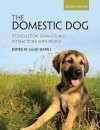By: James Serpell(Editor), Priscilla Barrett(Illustrator)
424 pages, 8 plates with colour photos and colour illustrations; b/w photos, b/w illustrations, tables
![The Domestic Dog The Domestic Dog]()
Click to have a closer look
About this book
Contents
Customer reviews
Biography
Related titles
Recommended titles
About this book
Why do dogs behave in the ways that they do? Why did our ancestors tame wolves? How have we ended up with so many breeds of dog, and how can we understand their role in contemporary human society? Explore the answers to these questions and many more in this study of the domestic dog. Building on the strengths of the first edition, this much-anticipated update incorporates two decades of new evidence and discoveries on dog evolution, behavior, training, and human interaction. It includes seven entirely new chapters covering topics such as behavioral modification and training, dog population management, the molecular evidence for dog domestication, canine behavioral genetics, cognition, and the impact of free-roaming dogs on wildlife conservation. It is an ideal volume for anyone interested in dogs and their evolution, behavior and ever-changing roles in society.
Contents
List of contributors
1. Introduction James Serpell
Part I. Origins and Evolution:
2. Origins of the dog: the archaeological evidence Juliet Clutton-Brock
3. Origins of the dog: genetic insights into dog domestication Bridgett Vonholdt and Carlos Driscoll
4. Evolution of working dogs Kathryn Lord, Richard Schneider and Raymond Coppinger
Part II. Behavior, Cognition and Training:
5. Genetics of dog behavior Linda van den Berg
6. Becoming a dog: early experience and the development of behavior James Serpell, Deborah Duffy and Andrew Jagoe
7. Breed and gender differences in dog behavior Benjamin Hart and Lynette Hart
8. Dog social behavior and communication John Bradshaw and Nicola Rooney
9. Ethology, ecology, and epidemiology of canine agression Randall Lockwood
10. Social cognition and emotions underlying dog behavior Friederike Range and ZsÓFIA VIRÁNYI
11. The learning dog: a discussion of training methods Ilana Reisner
12. Dogs in today's society: the role of applied animal behavior Stephen Zawistowski and Pamela Reid
Part III. Dog-Human Interactions:
13. Dogs and helping partners and companions for humans Lynette Hart and Mariko Yamamoto
14. The welfare of dogs in human care Robert Hubrecht, Stephen Wickens and James Kirkwood
15. From paragon to pariah: cross-cultural perspectives on attitudes to dogs James Serpell
Part IV. Life on the Margins:
16. Variation in dog society: between resource dispersion and social flux David Macdonald and Geoffrey Carr
17. The ecology and behavior of feral dogs: a case study from central Italy Luigi Boitani, Francesco Francisci, Paolo Cuicci and Giorgio Andreoli
18. Roaming free in the rural idyll: dogs and their connections with wildlife Joelene Hughes, David Macdonald and Luigi Boitani
19. Dog population management Elly Hiby and Lex Hiby
20. Epilogue: the tail of the dog James Serpell
Index
Customer Reviews
Biography
James Serpell is Professor of Animal Ethics and Welfare at the School of Veterinary Medicine, University of Pennsylvania. His research focuses on the behavior and welfare of companion animals, the development of human attitudes to animals, and the history and impact of human-animal relationships.
Contributors:
- James Serpell
- Juliet Clutton-Brock
- Bridgett Vonholdt
- Carlos Driscoll
- Kathryn Lord
- Richard Schneider
- Raymond Coppinger
- Linda van den Berg
- Deborah Duffy
- Andrew Jagoe
- Benjamin Hart
- Lynette Hart
- John Bradshaw
- Nicola Rooney
- Randall Lockwood
- Friederike Range
- Zsófia Virányi
- Ilana Reisner
- Stephen Zawistowski
- Pamela Reid
- Mariko Yamamoto
- Robert Hubrecht
- Stephen Wickens
- James Kirkwood
- David Macdonald
- Geoffrey Carr
- Luigi Boitani
- Francesco Francisci
- Paolo Ciucci
- Georgio Andreoli
- Joelene Hughes
- Elly Hiby
- Lex Hiby
By: James Serpell(Editor), Priscilla Barrett(Illustrator)
424 pages, 8 plates with colour photos and colour illustrations; b/w photos, b/w illustrations, tables
"The first edition of this book, published more than 20 years ago, broke new ground. It was the prelude to an explosion of research in the field of domestic dog behaviour, which has seen the subject move from largely the fringes of academia to a central position that provides a unique opportunity to explore some fundamental biological questions. This completely revised edition, continues in the tradition of the original text by selecting world leading experts to provide current insights into a range of important topics while also making the reader excited for the research which must follow to address the unanswered questions. I therefore have no doubt, that this edition, like the last, will inspire a whole new generation of canine scientists from across the academic disciplines."
– Daniel Mills, University of Lincoln
"The Domestic Dog should be in the library of all of those who study, live with, or are curious about dogs, their genetics and their behavior."
– Alexandra Horowitz, Barnard College, New York
"An outstanding and comprehensive collection of original and up-to-date essays to which everyone around the world who is interested in dogs should have easy access. It is inarguably the go-to reference on dogs. There also is a lot of very useful comparative information on wild canids that will help come to a greater appreciation and understanding of just who dogs are and why they do the things they do. And, the references are a gold mine of information. While we know a lot about these amazing beings, there still is much more to learn [...] I hope all dog trainers/teachers will carefully study this book because the ideas and data that are discussed are essential ingredients for teaching dogs to live harmoniously with other dogs, with other animals, and with us, a win-win for all. Now, it's time for yet another read."
– Marc Bekoff, University of Colorado
"The first edition of this book back in 1995 took a lead in sparking modern research in dogs. Now, more than twenty years later, the present edition rightly harvests the huge scientific knowledge that has been established by researchers all over the world [...] This book is a collection of chapters contributed by excellent experts on dog research. While behaviour remains the main focus of most chapters, the reader is also informed, amongst other things, about our actual understanding of dog domestication, the ecological perspectives of feral dogs and changing views in dog training. I warmly recommend this book to readers who want to be updated on this rapidly advancing field of canine science, and prefer first-hand knowledge from dedicated scientists."
– Ádám Miklósi, Eötvös Loránd University, Hungary
"[...] So how does this new edition compare to the original? I have to say that the new version is a brilliant update. While retaining the character of the original, it has been expanded with the addition of 7 new chapters, while authors retained from the original, who are 20 years more eminent than they were, have been diligent in updating, especially when acknowledging that ideas and interpretations have changed [...] A superb update of a classic book."
– Alan Crowden, BES Bulletin 48(1), April 2017





































